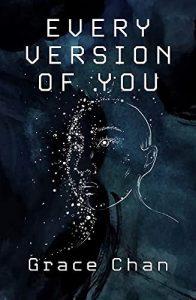Caren Gussoff Sumption Reviews Every Version of You by Grace Chan
 Every Version of You, Grace Chan (Affirm Press 978-1-92280-601-7, $32.99, 288pp, hc), July 2022.
Every Version of You, Grace Chan (Affirm Press 978-1-92280-601-7, $32.99, 288pp, hc), July 2022.
Tao-Yi and Navin are in love. Really in love. In the 2080s of Grace Chan’s Every Version of You, a supportive, genuine relationship like the one they have is just as precious and rare as right now.
Things are not easy for the couple, however. Tao-Yi’s mother, Xin-Yi, lives with chronic clinical depression. Navin has a serious autoimmune condition that affects his kidneys and the procedures and operations he’s tried have done little to improve the quality of his life, especially as he grows older. The planet is unbearably hot, to the point where no one can go outside without protective equipment. But they have one another, they have good friends, and they are free in Gaia, a true metaverse, completely immersive virtual reality, in which most people – aside from the very old or the very poor – live, work, and play, for up to 48 hours at a time, thanks to homeostasis-maintaining full-body pods.
In Gaia, they are free. Things are beautiful, easy. You can look like anyone or anything, go anywhere, or, with some coding experience, create whatever reality you want. It’s perfect – almost. Though within Gaia Navin can live more fully, without pain or fatigue, Tao-Yi secretly catalogs the ways in which Gaia, for all its glitter, cannot compete with reality.
Even though the real world is uncomfortable and difficult, in Gaia, Tao-Yi notices that the perfect looking beach is without that particular beach smell; that food, while exquisitely prepared, lacks the certain something of a home-cooked meal; and that while physical intimacy is not only possible but heightened on Gaia, she misses the imperfect intimacy of skin on skin. There’s also the issue of her mother, whom she loves dearly. For all Tao-Yi’s encouragement, Xin-Yi has little interest in the virtual world. Instead, she prefers to eke out her existence in meat space, comforted (and tormented) by her memories and Tao-Yi’s visits.
Because of this, Tao-Yi finds herself ambivalent about Gaia, in small ways she is, initially, happy to ignore. It is the way of the world, now, for the most part, and for Navin, it is nearly the whole of his experience. So, Tao-Yi rolls along, with things as they are – with one foot in the virtual world and one foot in the real.
So, it’s no surprise when the technology develops to the point where one can live full-time inside Gaia – through a mind upload that separates you from your physical body – that Navin has no hesitation. His physical condition will only deteriorate more, and he has none of the small resistances Tao-Yi does – though he is supportive of her, when she decides to put off her own upload to take care of her mother. At first, Tao-Yi’s decision is not fringe. Lots of people decide quickly to upload, but there are others, like her, who – despite the obvious benefit of, essentially, immortality – also wait.
She and Navin start a “long distance” relationship, initially easy, as the un-uploaded still perform most of their work and leisure in Gaia. But soon the world empties out, as most people who can upload themselves, including all Tao-Yi’s friends. Then Xin-Yi passes away. Even as Tao-Yi’s reasons for waiting to upload fall away, she still finds herself unwilling to fully give up the real world – even though she can’t say exactly why.
This is how Every Version of You sneaks in some really hard, fundamental questions about the mind-body problem, what it means to be human, what we are willing to sacrifice for another, and what – if any – is the difference between living and being alive. We aren’t fed more than Tao-Yi understands herself, which is really just that she doesn’t want to be a digital entity without a body. She can’t let go of the world, and while some of her reasons are clear, many are not. What’s compelling is that even though she can’t provide a solid, unified reasoning behind her resistance, she is willing to lose her relationship with Navin, to lose her identity and community, and go it nearly alone (though she does find a small group of humans to temporarily stay with, who are also un-uploaded for various reasons). She disconnects under the auspices of fulfilling a promise to her mother, to bring her ashes to scatter in a Malaysian temple from their past – which may or may not still exist. It will be a life-changing and long quest, as most commercial transportation has ceased as the population has fallen, and we are left watching her go, without a true resolution. Yet, we understand, somehow, the reasoning of those who chose to “go” and those who wanted to “stay,” even when those reasons are somewhat amorphous. It may be the future, but Chan directly addresses the anxieties of today, when many of us already live so much of our lives online.
It’s beautiful and sad, and feels right to not have a didactic edict of right vs wrong, or to elevate the mental over the physical. In the end, the environment in which we live is so much a part of who we are, and whether that setting is purely digital or physical matters less.
Caren Gussoff Sumption is a writer, editor, Tarot reader, and reseller living outside Seattle, WA with her husband, the artist and data scientist, Chris Sumption, and their ridiculously spoiled cat-children.
Born in New York, she attended the University of Colorado, the School of the Art Institute of Chicago, Clarion West (as the Carl Brandon Society’s Octavia Butler scholar) and the Launchpad Astronomy Workshop. Caren is also a Hedgebrook alum (2010, 2016). She started writing fiction and teaching professionally in 2000, with the publication of her first novel, Homecoming.
Caren is a big, fat feminist killjoy of Jewish and Romany heritages. She loves serial commas, quadruple espressos, knitting, the new golden age of television, and over-analyzing things. Her turn offs include ear infections, black mold, and raisins in oatmeal cookies.







